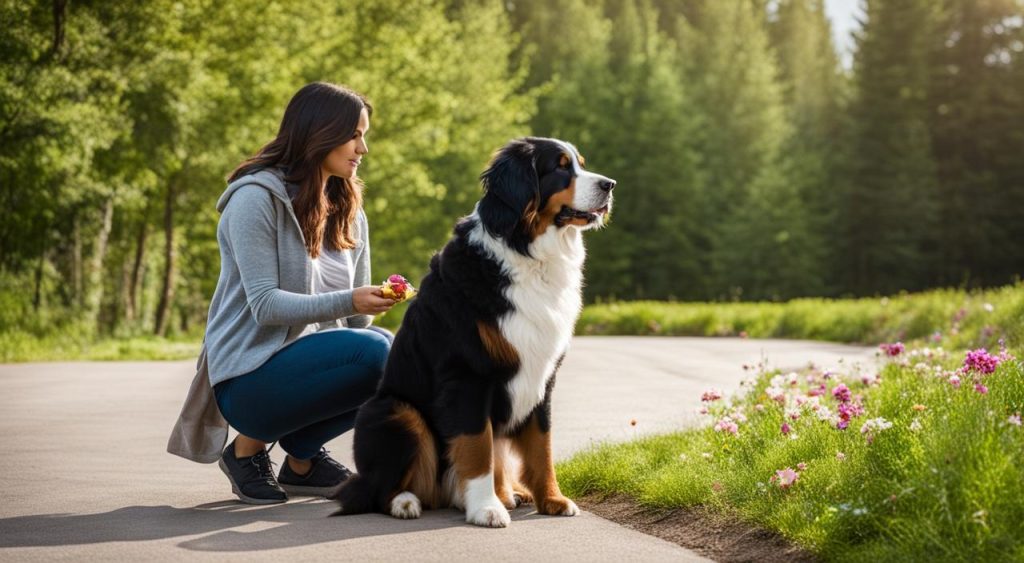When it comes to training Bernese Mountain Dogs, many prospective owners wonder about the challenges they may face. Are Bernese Mountain Dogs hard to train? The truth is, with the right approach, training these gentle giants can be a rewarding experience. While they are intelligent and eager to please, they also have their own unique needs and characteristics that should be taken into consideration.
Before diving into the world of Bernese Mountain Dogs training, it’s important to do your research and familiarize yourself with this wonderful breed. Attending regional club events and speaking with experienced owners can provide valuable insights into their training requirements and temperament. Additionally, understanding the responsibilities of owning a large, heavy dog is crucial to ensure a positive training experience.
Socialization is a key milestone in training Bernese Mountain Dog puppies. Exposing them to a variety of people, animals, and environments from an early age can help them develop into well-rounded companions. Housetraining is another important aspect, with a gradual increase in freedom as they learn the house rules.
Obedience training should commence after their second round of vaccines, focusing on controlling them and teaching them to interact properly with other pets and people. Grooming is also an essential part of their care, including regular brushing and nail trimming.
Exercise plays a vital role in the training and overall well-being of Bernese Mountain Dogs. Daily walks and swimming sessions provide physical and mental stimulation, preventing behavioral issues that may arise from pent-up energy. It is advisable to wait until they reach sexual maturity before spaying or neutering them, as this can affect their growth and development.
Remember, consulting with a veterinarian, breeder, or professional trainer can offer valuable guidance throughout these key training milestones. With patience, consistency, and positive reinforcement, you can overcome any challenges and train your Bernese Mountain Dog to be a well-behaved and happy companion.
Key Takeaways:
- Bernese Mountain Dogs are intelligent and have a gentle temperament, making them relatively easy to train.
- Research the breed and attend regional club events to gain insights into their training requirements.
- Socialization, housetraining, and obedience training are essential milestones to address in their training.
- Regular grooming and exercise are important for the overall well-being of Bernese Mountain Dogs.
- Consulting with professionals can provide valuable guidance throughout the training journey.
Tips for Training Bernese Mountain Dogs
When it comes to training Bernese Mountain Dogs, a patient and positive approach is key. These gentle giants respond best to positive reinforcement rather than harsh correction. Avoid striking or yelling at them, as it can cause stress and hinder their progress.
Rewarding good behavior with treats or praise is an effective way to motivate Bernese Mountain Dogs and encourage them to continue exhibiting desirable behaviors. Using treats as a training tool can be especially effective for these food-motivated dogs.
Start training sessions with short durations and gradually increase the length as your puppy’s attention span improves. Consistency and regularity are important for their progress, so aim for multiple short training sessions rather than one long session.
Begin training as soon as your Bernese Mountain Dog puppy arrives home. Focus on teaching basic commands, such as sit, down, and stay. These foundational commands build a strong basis for further training down the line.
Addressing bad behavior is equally important during training. Teach your Bernese Mountain Dog puppy to stop chewing on inappropriate objects by redirecting them to appropriate chew toys. This helps them understand what is allowed and what is not.
Establishing commands such as recall (come when called) and not jumping on people is essential for their safety and proper socialization. Consistently reinforcing these commands can prevent unwanted behaviors and ensure good manners.
Although Bernese Mountain Dogs are generally calm and good-natured, they can sometimes display stubbornness or dominance, especially in young males. Address these issues with a firm but gentle approach, providing consistent training and positive reinforcement.
Remember, training Bernese Mountain Dogs requires time and effort, but with patience, consistency, and positive reinforcement, you can successfully train these wonderful companions.
Conclusion
Bernese Mountain Dogs, although known for their calm and gentle temperament, require careful training and attention to specific milestones to become well-behaved and happy companions. Patience, positive reinforcement, and consistency are key to successfully train these majestic dogs.
Training Bernese Mountain Dogs involves addressing various aspects such as socialization, housetraining, obedience training, grooming, and exercise. By understanding their specific needs and catering to them accordingly, you can ensure their overall well-being and development.
However, it is important to note that training challenges may arise, including stubbornness or dominance issues. In such cases, seeking guidance from professionals who specialize in Bernese Mountain Dogs can be immensely helpful. With the right techniques and expert advice, you can overcome these challenges and establish a strong bond of trust and mutual understanding with your furry companion.
Remember, training Bernese Mountain Dogs is a journey that requires time, effort, and a steadfast commitment. By adopting a holistic approach and considering their unique characteristics, you can shape them into obedient and loving companions for years to come.





